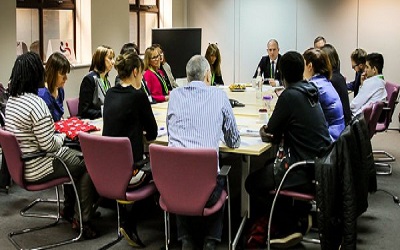
The North Swindon MP, and Minister for Disabled People, Justin Tomlinson has taken part in an important meeting with autistic jobseekers and a Twitter Q&A session, hosted by the National Autistic Society.
The Government announced last year that it wants to halve the disability employment gap – this means changing employers’ attitudes and getting more support for disabled people (including autistic people) to find work.
Justin has also joined forces with the NAS recently to promote the ‘Too Much Information’ campaign, the charity’s new campaign to improve public understanding of autism.
Justin Tomlinson MP said: “This was an important meeting with people living with autism from across the country to talk about how about we can halve the disability employment gap and improve support for autistic people who are seeking employment. Schemes such Disability Confident and Access to Work, as well as close working relationships with stakeholders, mean we are taking positive steps to improve the employment chances of autistic people.
Below you can read the Twitter Q&A.
@JC_Filmmaker: What programmes or sign-posting can be offered for media graduates like myself on the autism spectrum?
@MinisterDisPpl: One good way for graduates like you to gain knowledge and skills in an area of work such as filmmaking or media is gaining work experience. This can be achieved through Government programmes such as Work Choice and the Work Programme – both of which will work with you to secure work experience opportunities.
DWP has also worked with Volunteering Matters and Ambitious about Autism on work placement projects to help people with autism gain work experience in a range of sectors, with significant success. It is also useful to look on the websites of media organisations such as the BBC and ITV Granada to learn more about their commitment to diversity.
@reflektiv: Which specific areas do you see as the priority for improving pathways to and support in the workplace?
@MinisterDisPpl: The key thing we can do is work closely with NAS and other organisations to engage employers and help them to see the tangible benefits of recruiting and retaining people with autism.
DWP is communicating directly with employers through the Disability Confident campaign, helping them to see the many skills, talents and abilities of disabled people, including people with autism. Through Disability Confident, employers can share best practice, both online and at events.
DWP is also working with organisations such as Autism Alliance UK, The Dyscovery Centre andAutism Plus, looking at ways to improve DWP services. We are promoting autism awareness across Jobcentre Plus and have trained over 1000 staff so far to better support people with autism and associated hidden impairment conditions.
@davidjackson196: (How can we) encourage companies to let employees on the spectrum to work remotely from home, as office scenarios are stressful?
@MinisterDisPpl: More and more employers are enabling staff to work more flexibly, including working from home. Of course, this depends on the nature of the work and what is required of the employee. These days, many more jobs can be done remotely, either online or over the phone. Organisations such as the NAS and the Dyscovery Centre offer information both to people with autism and employers that help to identify appropriate reasonable adjustments, which may include home working.
@Leeds_Demon: What if autistic people want to go into self employment?
@MinisterDisPpl: You may want to consider the New Enterprise Allowance scheme that the Government has introduced to support people who want to start their own business. This scheme offers lots of practical advice, guidance and support and can offer information on grants, start up loans and other options.
People on the New Enterprise Allowance scheme receive financial help whilst getting started in business.
NB: Thank you to @MrMuso and @LizzieHampson for their similar questions.
@ARGHighland: We need autistic friendly schooling: staff, environment, non-bullying & acceptance = improved future job prospects.
@MinisterDisPpl: Through its Think Autism strategy, the Government as a whole is working to look at ways of improving services for people with autism and associated hidden impairment conditions. I know that ministers in Departments of both Health and Education are working hard to improve their services in accordance with the Autism Act 2009 (England).
I agree that it is important to improve knowledge and awareness about autism to improve understanding within society. Within my own department, DWP is training its staff to improve its services for people with autism. So far we have trained over 900 people and are continuing to train our employer-facing staff so that they can support employers to see the benefits of employing people with autism.
@Helen_Ellis: Why are employers allowed to make statements like "must have good communication skills" be 'essential' in the job specification?
@MinisterDisPpl: It is a fact that some jobs do require “good communication skills” and when that is the case it is important that the employer details this and the reasons for this in the job specification. However, I agree with you that this is not the case for all jobs.
Through Disability Confident, DWP is encouraging employers to really think about the actual task of the job they are recruiting for and whether it could be achieved in different ways. It is important to take into consideration reasonable adjustments that might enable disabled people, including people with autism, to do the task and job effectively.
Disability Confident provides employers with information to adjustment their recruitment practices to ensure they are inclusive for people with autism.
@ tomkell29: How can we ensure that companies get training on dealing with autistic people? Some companies seem to struggle with this.
@MinisterDisPpl: It is the Government’s role, through campaigns such as Disability Confident, to promote best practice initiatives and provide training to employers so that they better understand how to support disabled people into work, including people with autism and associated hidden impairments.

